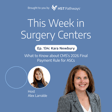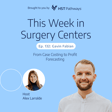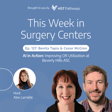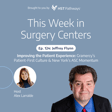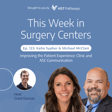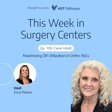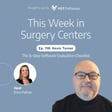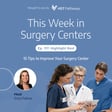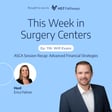Show Introduction
00:00:01
Speaker
Welcome to This Week in Surgery Centers. If you're in the ASC industry, then you're in the right place. Every week, we'll start the episode off by sharing an interesting conversation we had with our featured guests, and then we'll close the episode by recapping the latest news impacting surgery centers. We're excited to share with you what we have, so let's get started and see what the industry's been up to.
00:00:27
Speaker
Hi, everyone. Here's what you can expect on today's episode.
Guest Introduction: Scott Bacon
00:00:31
Speaker
Our guest today is Scott Bacon. Scott is the vice president of business development at Compass Surgical Partners, and he's here to cover how you can successfully convert a hop D into an ASC.
Why Convert HOPD to ASC?
00:00:44
Speaker
There are a ton of benefits to making the switch, such as market growth, reimbursement differences, physician retention, and high acuity case migration. In our news recap, our first two stories will cover anesthesia. So the first is about the current state and issues that ASCs are facing. And then the second story is about how one facility avoided closing operating rooms by getting creative with their anesthesia coverage.
00:01:09
Speaker
We'll then cover the cyber attacks on change healthcare. And of course, end the news segment with a positive story about a woman who became a nurse after being so inspired by the nurses who helped care for her son. Hope everyone enjoys the episode and here's what's going on this week in surgery centers.
Trends Driving HOPD to ASC Conversion
00:01:30
Speaker
Scott, welcome to the show. Nick, thanks for having me. Excited to be here.
00:01:35
Speaker
Scott, excited to talk through with you today, HOPDs, hospital outpatient departments, and ASCs. And one of the trends that we see in the market is around the conversion of HOPDs to ASCs. And I was wondering from your perspective, what are some of the drivers of this trend?
Cost Differences: HOPD vs ASC
00:01:52
Speaker
Yeah, we're seeing this more and more from health systems that we're having conversations with, and there are multiple drivers. I think one of the primary drivers is physician alignment. How can health systems
00:02:05
Speaker
recruit and retain and continue to align with both employed and independent physicians. Another driver that's being evaluated is their managed care aspects and relationships with the payers. Obviously, for those unaware, the ASC presents a lower cost or lower reimbursement site of service when compared to HOPDs. How does that impact their managed care relationships?
00:02:31
Speaker
lowering the cost of care for their ultimately their patients who are their end user and their consumer. Probably the third component that's being evaluated is the consumer demand. Consumers are becoming savvier with higher deductible plans and cost of care is a big driver for the patient. And if they can minimize that cost and have that procedure
00:02:56
Speaker
safely performed in an outpatient ASC setting versus an HOPD. We're seeing that being a driver as well.
ASC Benefits for Physicians
00:03:04
Speaker
Got it. And so you gave three reasons there. I wanted to dig in and follow up just on each of those real quick. You mentioned the managed care and the cost side of the equation with procedures in the ASC typically being cheaper. What are some of the reasons that underpin that cost difference?
00:03:22
Speaker
Well, Medicare has a different fee schedule for ASC reimbursements versus an HOPD. So I can give a couple of examples, just average cost of care for a two procedures we see fairly commonly at our centers, a rotator cuff arthroscopic repair, average cost in a hospital outpatient department is $10,258.
00:03:47
Speaker
Compared to in an ambulatory surgery center, that facility fee cost being $6,285. If you also look at a knee replacement surgery, fairly common these days, more and more that's being done in the ambulatory surgery center setting. The hospital costs for having that done outpatient is $18,096.
00:04:09
Speaker
And the average cost in a surgery center is $13,734. So pretty significant cost savings when you look at it on just those two examples. And that's fairly indicative across the spectrum of procedures being done in the ambulatory surgery center setting. Right. And is it the facility fee that drives a lot of that cost difference?
00:04:29
Speaker
That is strictly the facility fee. The professional fee that the physician gets reimbursed
Impact of Consumer Demand & Price Transparency
00:04:34
Speaker
stays the same. There's an anesthesia component to these surgeries as well, which is separately billed and a separate invoice. The patient will receive as well. Okay. Got it. So that's the cost side. You mentioned the consumer demand side as well. Do you think the price transparency regulations on
Recruiting & Retaining Physicians through ASCs
00:04:53
Speaker
the hospital started or starting to play into this? Or what do you see as.
00:04:58
Speaker
the change in consumer education, consumer demand, consumer transparency? I think it's still fairly early on the price transparency. I think it's ultimately the right direction for healthcare and where we're going. It's going to take a lot of time to implement. I think less than a quarter of the hospitals have complied so far with the 21 regulation.
00:05:19
Speaker
But consumers are becoming well-educated sometimes by their peers and their neighbors and understanding that, Hey, I can have my knee replacement done and be home and sleep in my own bed while it's clinically very safe, but also it's going to cost me less from an out of pocket standpoint. But that's driving a lot of the demand as well. A lot of our physician partners are having those requests come directly from their patients prior to the scheduling surgeries.
00:05:48
Speaker
Got it. Okay. And then the third piece was
Future of Reimbursement Models
00:05:52
Speaker
on the physician side. And so one of the benefits from the ASC perspective for physicians might be the chance for equity ownership in the facility and distributions. Do you see any other advantages that really draw physicians to prefer an ASC setting over HOPD?
00:06:11
Speaker
The kind of time and money, if you will, money, you mentioned a lot of these partnerships are equity partnerships with the physicians, having a direct economic interest, but also the time, the turnover in an ambulatory surgery center from turnover time, they refer to it as in the industry when compared to a hospital setting is drastically less relatively speaking across the board. So if we can enable a surgeon to perform more cases in a shorter period of time,
00:06:41
Speaker
they're helping more patients and getting time back in their day. As we evaluate these potential new centers and opportunities with physicians, it's not uncommon for us to hear physicians leaving the operating room after being there all day at six, seven, eight o'clock at night. And if we look at their caseload and what they did that day,
00:07:04
Speaker
They could easily be done in ambulatory surgery center by early afternoon timeframe while performing the same number of cases, enabling their patients to recover and discharge same day as well. So, uh, it's really a quality of life and giving them more time back in their day as well. Sure. And you mentioned on that physician side, for those reasons that you talked about from a time and money perspective, that ASCs can be a good strategy for
00:07:31
Speaker
physician recruitment for health systems and wanting to be competitive. What do you see on the physician retention side? Do you feel like providing the ASC option to physicians and physicians feeling like they have a good setup from an ASC perspective makes them stickier to that health system less likely to live? Sticky is a good word for two reasons. One, I think we enabling them to be a part of an A gives them more
00:08:00
Speaker
control in the equipment selections, the staffing, how we set it up. We really work towards ensuring the physicians have a voice at the table in these ambulatory surgery centers, which tends to be a little unique from what they're used to in the hospital setting. Number two is around the retention is
00:08:20
Speaker
making sure that this is an option for them as an employed surgeon. More and more health systems are permitting their employed surgeons to directly invest in these ASC partnerships. The health system's not there yet and not comfortable with that. There is risk that their surgeons from an employed standpoint could leave to go to another hospital system across town that may offer this to the differentiator or leave and go join a private practice because of this opportunity.
00:08:50
Speaker
That makes total sense. Scott wanted to circle back and talk about, we've talked about the cost side. So traditionally for HOPDs, there has been a reimbursement difference and a reimbursement advantage over ASCs. Have you seen that declining over time? And as you kind of look in your crystal ball over the next five, 10 years, what do you anticipate happening to that cost advantage?
00:09:15
Speaker
Well, site neutrality payments have been discussed while not in regular or have not come to fruition yet. I don't think that it's off the table in the next five to 10 years. As we're seeing the data for outcomes or
00:09:32
Speaker
for cases being performed in ambulatory surgery centers meeting or a lot of times exceeding those of a hospital outpatient department. I think CMS and the payers, commercial payers will start to understand that there's a clinical benefit to having patients have these cases performed in an ambulatory surgery center setting. So I
Steps for ASC Strategy
00:09:54
Speaker
think that is just gonna continue to exasperate over time as the clinical outcomes and the data shows that these are
00:10:02
Speaker
high quality operating environments when compared to a hospital outpatient department. Got it. So how do health systems think about this, right? You cited three advantages potentially from a health systems perspective as they think about physician recruitment and retention, as they think about the cost of care, as they think about consumer demand, especially consumer demand over time as you play that into the future.
00:10:27
Speaker
So for health systems that are kind of bought into this and say, hey, we want to have more of an ASC strategy and presence, we potentially want to think about converting some HOPDs to ASCs. Where do you start? What's the first couple of steps in the process? Yeah, that's a great question. And it can be overwhelming on the front end. I'd say the first is it's a very thorough economic analysis. Obviously, if they shift these cases from an HOPD to an ASC, they're overnight.
00:10:57
Speaker
to be reimbursed less. So why would a health system want to make less money overnight? And what are the offsetting sometimes non-financial factors that would impact that decision? So I think a detailed financial analysis as to what is the ultimate impact to the hospital just on that case volume. The flip side of that coin is what is the
00:11:23
Speaker
corresponding or ancillary strategies that may be impacted. All the ancillary service lines that are tied to that surgical procedure, some examples of that are pathology imaging, pathology imaging, PT, therapy. There's all types of ancillary services that are based around one patient surgical procedure. And what are the impacts to that?
00:11:50
Speaker
The, probably the bigger impact to evaluate is what's our opportunity to grow our market share? How could a new facility in alignment with physician partners in that entity, how can we grow the utilization of our market share with physician alignment? That could look like reload, putting an ASC in a new geography, which is a lower cost to bill that then putting up a new house, a hospital outpatient department.
00:12:19
Speaker
recruiting and attracting new service lines or simply more independent physicians who potentially are performing cases at a hospital across town, enabling them to then have an ownership interest in utilization of an ambulatory surgery center that's more conveniently located to them.
00:12:40
Speaker
It's all of those, it's a, it's not a one recipe for success. It's really understanding the market, the physician dynamics, the current future market share of the health system. And then secondarily is some health systems also have involvement with a managed care policy for their patient base. So are they involved in a commercial insurance plan and what's the corresponding impact on the backend?
00:13:08
Speaker
if we can lower the cost of care for some of these patients. Got it. And you touched on the market share side and the geography side, and just want to double click on that. Because it seems like these health systems, they think about their ASC strategy, you can go about it some different
Lessons from HOPD to ASC Conversion
00:13:27
Speaker
ways, right? You could go about it through acquisition, you could go about it through de novo, you could go about it through an HOPD conversion if you have existing HOPDs. How have you seen health systems
00:13:39
Speaker
evaluate that trade-off of, hey, should we build new de novo ASCs versus possibly looking to convert existing HOPDs? Again, I think we typically recommend starting with the financial analysis and running a parallel course. What does it look like from a cost and timeline perspective to convert an existing HOPD? And alternatively, what would it look like if we maintain that existing HOPD but built a de novo center
00:14:09
Speaker
in, from a cost and timeline perspective. Geographically, is the HOPD where you want those ASC cases done? Or does it make sense to broaden the reach of the health system into a new or corresponding market? So it's really a cost analysis. And then how do they backfill or utilize that existing HOPD space? Will they backfill it with other specialties? Will they convert it to another type of service line within the health system?
00:14:39
Speaker
So all of that goes into play, real estate, existing space needs, future space needs, where's the population growth of the patient base and the physician community in that market. So it's again, it's not a one size fits all. It's a very dynamic financial and kind of very much non-financial analysis that needs to be done.
00:15:03
Speaker
Yep. It seems like there's some thought and analysis, as you mentioned, and a lot of variables that go into the decision. How do health systems typically approach this? Do they have... Is this a person? Is this a department that kind of does this analysis? Are these external consultants? What's kind of the range of ways that you've seen health systems structure the analysis or put responsibility around it?
00:15:32
Speaker
Yeah, so more and more health systems are evaluating joint venture partnerships in these ambulatory surgery centers with ASC development and management specialty companies. Similar to HST being the kind of the expert in the ASC space, there are companies out there that are experts in the evaluation process and then the execution component to that strategy as well once it's finalized.
00:16:02
Speaker
So most health systems are starting to bring in that external resource who has experience running these ambulatory surgery centers, much lower cost service, so that they're operated very differently than your traditional HOPD setting. So it's a different mindset. It's a different calculation.
00:16:22
Speaker
Some health systems have that expertise in house, but I would say more and more today are looking to outsource or align with third party experts in that realm. Yeah. It makes sense. Just given, I'm sure all the learnings that go into this, that you don't want to start from scratch every time. I'm sure you can learn. I'm sure the.
00:16:43
Speaker
Companies that specialize this learn a lot every time and they can apply that to the new cases. Scott, on that thought, wanted to ask you about lessons learned. What have you seen in the industry from a lessons learned perspective from health systems that have approached their ASC strategy and learnings from that that can be applied elsewhere?
00:17:02
Speaker
Sure. Many. I would say first and foremost is underestimating the cost to convert an HOPD and the timeline associated with that.
Improving Surgery Centers
00:17:13
Speaker
Just because it's successfully performing HOPD cases today, to re-license that space as an ambulatory surgery center may be different guidelines or different requirements for the physical plant. So there may be construction involved. You know, how long does that,
00:17:32
Speaker
the design, the permitting, the construction, the re-licensure process take. What is the cost to do that? How do we fund that cost over that period of time? I think most importantly is can they ensure that they have a home for those cases to be done elsewhere during that conversion process?
00:17:54
Speaker
Though on paper, it seems like it may be an easy kind of flip the switch and overnight it's an ASC. In reality, it's a much more complex conversion process from a time intensity and cost standpoint. Got it. That's a good one. Okay. Scott, final question for you here. And we do this each week with all of our guests. What's one thing our listeners can do this week to improve their surgery centers?
00:18:25
Speaker
Great question. My wheels are turning. I would say first and foremost, we take very seriously compass the care being delivered to each and every individual patient. That's a very serious life event for a family and the patient on the table.
00:18:44
Speaker
That care is delivered by the front end clinical staff at the ambulatory surgery center. So what can be done this week? I would say make sure your clinical team on-site delivering that patient care understands their valued, understands how important they are to each and every patient that comes across that table and really just thank them for their work, their commitment and their passion that they deliver these patients day in and day out.
Anesthesia Staffing Challenges
00:19:14
Speaker
Awesome, that's what it's all about. Scott, thanks for joining us this week. Nick, appreciate it. Thanks so much.
00:19:24
Speaker
As always, it has been a busy week in healthcare, so let's jump right in. The issue of anesthesia coverage is a significant challenge facing surgery centers right now. Several ASC admins were cited in this ASC Focus article sharing that maintaining anesthesia provider staffing is a constant concern, and even if you have the necessary coverage, the threat of being understaffed looms constantly.
00:19:49
Speaker
So how did we get here? Dr. Derek Fleming of Midwest Physicians Anesthesia Services explains that this stems from a severe shortage of anesthesia providers compounded by decreasing reimbursement rates for their services. Factors contributing to the shortage include early retirements prompted by COVID, an aging workforce, and an increased demand for anesthesia services across various medical settings.
00:20:16
Speaker
The competition for anesthesia providers has become particularly fierce with hospitals, which often offer more attractive working conditions and compensation. This has made it increasingly difficult for ASCs to compete, especially since they typically operate at a faster pace and may offer lower rates.
00:20:35
Speaker
So to combat these issues, some ASCs are now employing their own anesthesia teams or offering subsidies to private groups. This is a strategy traditionally employed by hospitals, but it's becoming more common in the ASC setting as they seek to ensure adequate staffing levels.
00:20:52
Speaker
So what else can you do? ASC leaders are also advised to foster open and trusting relationships with providers, anesthesia providers specifically, create a collaborative and inclusive environment, offer leadership opportunities, and engage anesthesia providers in the ASC's quality and policy discussions to hopefully improve retention and loyalty.
Columbia Orthopedic's Anesthesia Strategy
00:21:14
Speaker
So given all the issues that have occurred due to the anesthesia staffing shortages, please make sure you remain proactive and are always in planning mode for anesthesia coverage and try to have a plan B and plan C where possible if you can.
00:21:30
Speaker
And I want to continue this anesthesia discussion into the second story because I really hate to present a problem without a solution. So let's talk about how Columbia Orthopedic Group in Missouri avoided shutting down due to a shortage in anesthesia coverage, which was directly impacting their ability to schedule and conduct surgeries. So Andrew Lovewell is the CEO of Columbia Orthopedic Group.
00:21:58
Speaker
And he is sharing how this, their anesthesia staffing shortage was threatening their operations. And he stated, and I quote, we were going to maybe potentially shut down rooms or we had to shut down rooms intermittently. That hurts the bottom line because if you can't do surgery, you can't figure out how to pay all the costs associated with running a big ASC like ours.
00:22:20
Speaker
Okay. So what did they do Columbia orthopedic group took a bold step by shifting its model and employing its own anesthesia group, a move away from the traditional outsourcing of these services. This decision wasn't just about filling a gap. It was about aligning incentives for growth, improving the compensation and benefits for the anesthesiologists and ensuring the surgery center could maintain top talent and quick case turnovers.
00:22:48
Speaker
So Love Well emphasizes the importance of adapting to the anesthesia crisis facing ASCs nationwide, highlighting the need for quick, efficient operations that meet the high demands of their environment. So by bringing anesthesiologists in-house and enhancing their employment package, Columbia Orthopedics aims to create a more attractive and efficient workplace that stands out in the competitive healthcare market.
00:23:13
Speaker
Now, I know not every surgery center will be able to go this path due to size and operating budget and all of that, but if you are a larger group, it is something that you might want to really consider. But overall, this approach represents a mindset shift in handling anesthesia services as a whole, viewing them as a critical business line rather than just kind of this peripheral third-party service.
Cyber Attack on Change Healthcare
00:23:38
Speaker
And it also reflects a broader necessary trend as highlighted in our first story, where ASCs are increasingly seeking innovative solutions to stay operational and competitive amidst widespread anesthesia staffing challenges. So I hope between those first two stories, it might give you some good ideas or at least inspire you as to how you can solve your own anesthesia staffing challenges if you are experiencing any.
00:24:05
Speaker
All right, switching gears away from anesthesia for now. As you have likely heard, UnitedHealth owned tech company Change Healthcare has been hit hard by a significant cyber attack with systems shut down for over a week due to a ransomware attack. This disruption has significantly impacted providers, stalling pharmacy operations and various other essential services.
00:24:32
Speaker
Change Healthcare is an integral part of the healthcare infrastructure, offering a slew of services, including payment processing, billing, prescription handling, and data analytics. For context of how vast this disruption is, the firm processes 15 billion healthcare transactions annually and touches one in every three patient records. So as you can imagine, the fallout from this cyber attack is extensive.
00:24:59
Speaker
Healthcare systems have reported a range of problems from disrupted revenue management to delays in prescription processing. And despite assurances, there has been no clear timeline for when services will return to normal. Now I'm recording this on Monday, March 4th. You're likely listening to it a week later. So hopefully by now there will be an update. But as of today, there's been no clear timeline for when services will return to normal.
00:25:25
Speaker
And this has forced healthcare providers to adopt manual workarounds, which are less efficient and more time consuming than their digital counterparts, as we know. And the ransomware group, AlfV, also known as BlackCat, has stepped forward claiming responsibility for the breach.
00:25:43
Speaker
So this incident really underscores the rising cyber risks in healthcare highlighted by a staggering increase in data breaches and ransomware attacks in recent years. The attack on change healthcare serves as a reminder of the healthcare industry's vulnerabilities and the pressing need for airtight cybersecurity measures.
00:26:05
Speaker
And healthcare entities are advised to prepare for such incidents with contingency plans, yet these healthcare ecosystems have such a complex and interconnected nature. It does make it very challenging to isolate and protect against cyber threats. So just another wake-up call that is emphasizing the need for tight cybersecurity protocols and preparedness.
Inspiring Story: Callie Burnett's Journey
00:26:29
Speaker
And to end our new segment on a positive note, Callie Burnett's son, Spencer was born with congenital heart defects and spent nearly two months in the NICU.
00:26:38
Speaker
This life-altering experience led Burnett, formerly involved in a family business, to become a NICU nurse at Riley Hospital for Children in Indianapolis, the very place that provided critical care for Spencer, her son, after his birth. Her firsthand experience with the hospital's caring staff during a frightening time inspired Burnett to pursue nursing
00:27:01
Speaker
aiming to provide the same support and care to other families facing similar challenges. After completing nursing school, which she described as tough but well worth it, Burnett knew her heart belonged at Riley Hospital for Children, where today as a NICU nurse, she offers a unique perspective to anxious parents, sharing her empathy and understanding rooted in her own experiences.
00:27:24
Speaker
Meanwhile, Spencer is now an energetic second grader and avid sports enthusiast, and he continues to thrive, bringing joy and laughter to those around him. And that news story officially wraps up this week's podcast. Thank you, as always, for spending a few minutes of your week with us. Make sure to subscribe or leave a review on whichever platform you're listening from. I hope you have a great day and we will see you again next week.

